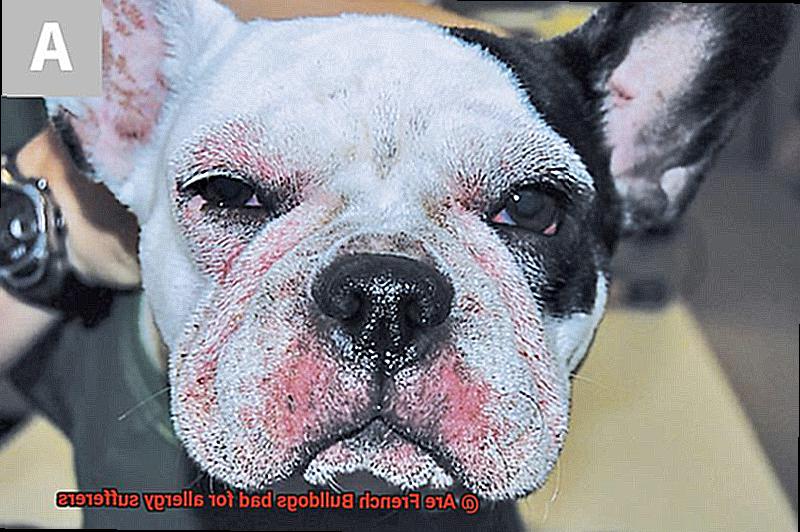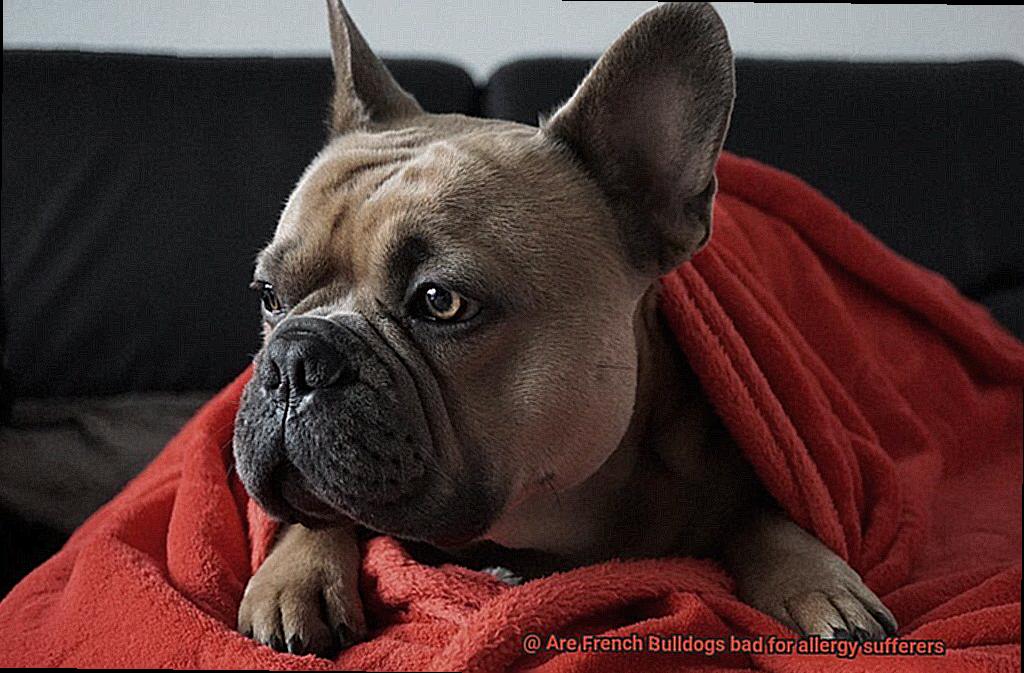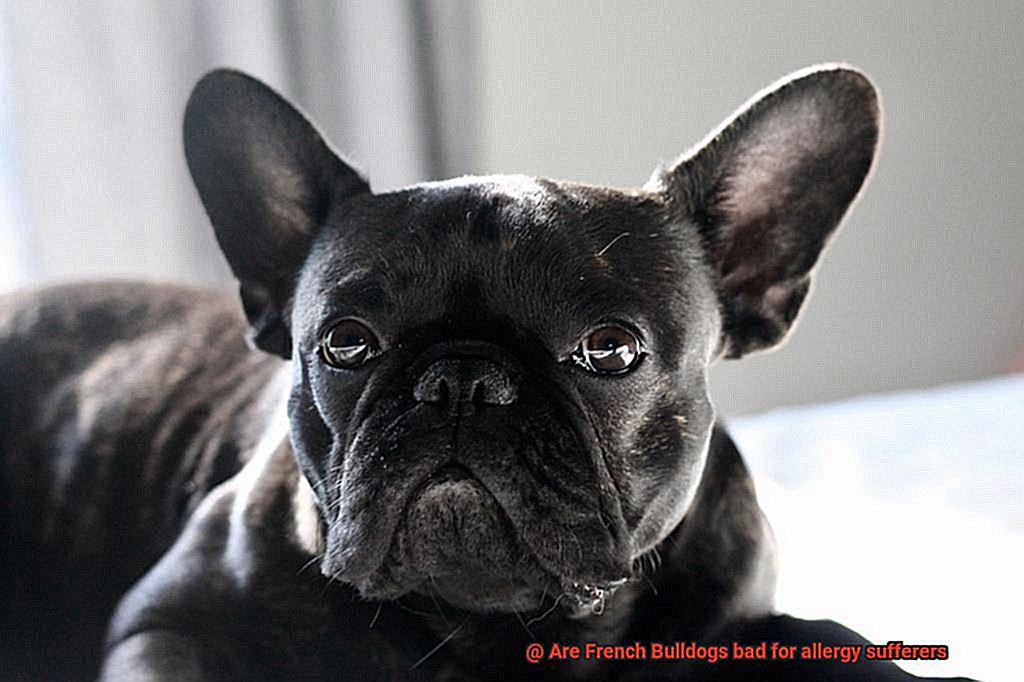Are French Bulldogs bad for allergy sufferers?
Living with allergies is like walking a tightrope, especially when you yearn for a cuddly companion. The sneezing fits, itchy eyes, and constant sniffles can make even the most determined allergy sufferer question their love for furry friends. Enter the French Bulldog, the four-legged charmer with a face that could melt the iciest of hearts. But hold your horses. Before you start envisioning endless snuggles and wet kisses, let’s address the burning question on every allergy sufferer’s mind: Are French Bulldogs really bad for those with allergies? In this blog post, we’re going to dig deep into the world of French Bulldogs and allergies, separating fact from fiction so you can make an informed decision about bringing one of these adorable pups into your home.
Understanding Allergies and Dog Breeds
Contents
- 1 Understanding Allergies and Dog Breeds
- 2 The French Bulldog’s Coat and Grooming Habits
- 3 Can French Bulldogs Trigger Allergic Reactions?
- 4 Before Buying a French Bulldog: Testing for Allergies
- 5 Managing Allergies with a French Bulldog in the Home
- 6 Medications That May Help Relieve Symptoms of Allergies
- 7 Variations in Allergy Sensitivity Among Individuals
- 8 Conclusion
Allergies can put a damper on our lives, but that doesn’t mean we have to give up on our dreams of having a furry companion. If you’re an allergy sufferer considering adding a French Bulldog to your family, it’s essential to understand how different dog breeds can affect your allergies. In this article, we’ll explore the effects of dog breeds on allergies, with a specific focus on French Bulldogs.
Understanding Allergies:
Allergies occur when the immune system overreacts to substances known as allergens. Common symptoms include sneezing, itching, and watery eyes. There are various types of allergies, including seasonal allergies, food allergies, and pet allergies. Pet allergies are caused by allergens present in a pet’s dander, saliva, and urine.
The Impact of Dog Breeds:
Different dog breeds produce varying amounts of allergens. While no breed is completely hypoallergenic, some breeds are known to produce fewer allergens compared to others. French Bulldogs, with their short coats and minimal shedding, are often considered a better choice for allergy sufferers.
French Bulldogs and Allergies:
French Bulldogs are incredibly popular due to their adorable looks and affectionate nature. They have short coats, which means they may produce fewer allergens compared to breeds with longer coats. However, it’s crucial to note that individual reactions to allergens can vary. Some people may still experience allergies even with a low-allergen breed like the French Bulldog.
Factors That Contribute to Allergies:
Apart from breed-specific characteristics, other factors can contribute to allergies in pet owners. Grooming and cleanliness play key roles in reducing allergens in the home. Regular grooming and cleaning practices, such as brushing the dog’s coat frequently and vacuuming regularly, can help minimize allergy triggers.
Consulting a Healthcare Professional:
Before bringing any pet into your home, it’s essential to consult with an allergist or doctor. They can conduct tests to identify specific triggers and provide guidance on managing allergies in a pet-friendly environment. It’s also recommended for potential French Bulldog owners with allergies to spend time with the breed to determine if their allergies are manageable.
The French Bulldog’s Coat and Grooming Habits
The French Bulldog’s Coat and Grooming Habits: Keeping Your Frenchie Looking Fabulous
When it comes to the French Bulldog’s coat, there’s good news for allergy sufferers – their short and smooth coat is relatively low maintenance compared to other breeds. But don’t be fooled, these adorable pups still shed, although not as much as some other breeds. So, how can you manage their shedding and potential allergens? Let’s dig in.
Brushing: The Key to a Shed-Free Home
Regular brushing is essential in managing shedding and keeping your home fur-free. Grab a soft bristle brush and give your Frenchie’s coat a good once-over at least once a week. This helps remove loose hairs and reduces the amount of hair that ends up on your clothes and furniture. Plus, it’s a great bonding activity that your Frenchie will love.

Bathing: The Occasional Suds-Up
While French Bulldogs don’t require frequent baths, giving them a good scrub every 2-3 months helps keep their coat clean and minimizes potential allergens. Opt for hypoallergenic shampoos that are gentle on your Frenchie’s skin and won’t irritate allergy sufferers.
Clean Living Area, Happy Allergies

To minimize allergens in your home, keeping your Frenchie’s living area clean is crucial. Regular vacuuming, dusting, and washing of bedding can help reduce the dander and hair particles that trigger allergies. Remember, a clean home means happy allergies.

Saliva and Urine: The Sneaky Culprits
Now, let’s talk about something that might surprise you – dog saliva and urine. French Bulldogs, like all dogs, produce saliva and urinate. Some individuals may be specifically allergic to these substances. If you or someone in your household is allergic, take precautions when handling or cleaning up after your Frenchie to minimize exposure.

Hypoallergenic, Not Allergy-Proof
While French Bulldogs are generally considered hypoallergenic due to their short coat and minimal shedding, it’s crucial to remember that everyone’s allergies are different. Some people may still experience allergies despite having a Frenchie as a pet. If you’re considering getting a French Bulldog, consult with an allergist or spend time with the breed to assess your reaction before making a decision.
Can French Bulldogs Trigger Allergic Reactions?
Allergies occur when the body has a reaction to certain proteins found in the dander, saliva, and urine of animals. So, do French Bulldogs cause allergies? Let’s dive into the research and find out.
French Bulldogs, like all dogs, produce dander, which is made up of tiny skin particles that can trigger allergic reactions in susceptible individuals. However, French Bulldogs are considered to be a hypoallergenic breed. This means that they are less likely to cause allergies compared to other dog breeds.
One reason for this is that French Bulldogs have shorter hair and shed less compared to breeds with longer hair or double coats. Shedding is the main source of allergens in dogs, as the dander and saliva proteins are more likely to be released into the environment when dogs shed. French Bulldogs also have a smooth coat that doesn’t trap as much dander as breeds with wiry or curly hair.
It’s important to note that while French Bulldogs are hypoallergenic, there is no such thing as a completely hypoallergenic dog. Individual allergic reactions can vary, and some people may still experience allergies despite the hypoallergenic qualities of French Bulldogs.
If you have severe allergies or asthma, it is recommended to spend time with a French Bulldog before bringing one into your home. This will allow you to assess your tolerance to their dander and other allergens they may produce. Regular grooming and cleaning can also help minimize allergens in the home.
Before Buying a French Bulldog: Testing for Allergies
French Bulldogs are beloved pets, but for allergy sufferers, it’s crucial to test for allergies before bringing one into your home. Allergies to pets can cause a range of symptoms, from sneezing to difficulty breathing. In this section, we’ll explore why testing for allergies is important and the various tests available.
Why Test for Allergies:
- Determine Allergic Reactions: Testing for allergies will help you determine if you are allergic to dogs or specific breeds like the French Bulldog. It’s essential to consult a medical professional specialized in allergies for accurate results.
- Confirm Compatibility: If you already have allergies but are determined to bring a French Bulldog home, additional tests can be done. Spending time with French Bulldogs or other dog breeds will help you assess if you have an allergic reaction.
- Monitor Symptoms: Pay close attention to any symptoms during interactions with French Bulldogs. Sneezing, itching, or difficulty breathing may indicate an allergy. Ignoring these symptoms can lead to worsened allergies over time.
- Assess Allergy Severity: Discussing your allergies with an allergist will help determine the severity and manageability of your allergies. Mild allergies may be controlled with medication or lifestyle changes, while severe allergies may make it difficult to live with a dog.

Types of Allergies:
Varying Allergens: Allergies can vary from person to person. Some individuals may be allergic to dog dander (dead skin cells), while others may be allergic to dog saliva or urine. Even if you don’t have an allergic reaction during testing, you may still develop allergies to specific aspects of owning a French Bulldog.
Considerations and Precautions:
- Home Cleanliness: Regular grooming, including brushing and bathing your French Bulldog, can reduce allergens like dander. Keeping your home clean and vacuumed frequently can also minimize allergen presence.
- Individual Differences: It’s important to remember that allergies and their severity can differ among individuals. What works for one person may not work for another. Consulting with an allergist will help you tailor your approach to managing allergies.
Conclusion:
Testing for allergies before buying a French Bulldog is crucial for allergy sufferers. It helps determine if you’re allergic to dogs or specific breeds, allows you to assess compatibility, and monitor symptoms. Allergies can vary, so it’s important to discuss their severity with an allergist. By taking these precautions, you can make an informed decision about bringing a French Bulldog into your home, ensuring a safe and enjoyable experience for both you and your furry friend.
Managing Allergies with a French Bulldog in the Home
Are you an allergy sufferer dreaming of owning a French Bulldog? While these lovable pups may not be hypoallergenic, there are ways to manage allergies and enjoy the companionship of a Frenchie. In this article, we’ll explore strategies to minimize allergens and reduce allergic reactions, so you can have a “pawsome” experience with your furry friend.
- Regular Grooming: Brushing your French Bulldog’s coat regularly can help minimize the amount of dander they produce. This prevents it from spreading around your home and triggering allergies. Bathing your Frenchie with hypoallergenic shampoos can also reduce allergens on their skin.
- Frequent Vacuuming: Vacuum your home frequently, especially areas where your Frenchie spends most of their time. Consider using a vacuum cleaner with a HEPA filter to effectively trap pet dander and other allergens.
- Clean Bedding and Furniture: Wash your Frenchie’s bedding regularly to eliminate accumulated allergens. Using hypoallergenic covers on furniture where your Frenchie likes to rest can also prevent dander from settling into the fabric.
- Air Purifiers: Invest in a good quality air purifier with a HEPA filter to remove airborne allergens from your home. Place the purifier in rooms where you and your Frenchie spend the most time for cleaner air quality.
- Personal Hygiene: Practicing good personal hygiene is essential. Wash your hands after petting or playing with your Frenchie to prevent allergens from coming into contact with your face or other sensitive areas.
- Consultation with an Allergist: If you or a family member have severe allergies, it’s advisable to consult with an allergist. They can conduct tests to determine specific allergens causing reactions and provide personalized advice on managing allergies while living with a French Bulldog.

Medications That May Help Relieve Symptoms of Allergies

If you’re a proud owner of a French Bulldog but suffer from allergies, don’t fret. There are medications available that can help alleviate your symptoms and allow you to enjoy the company of your furry friend. Let’s take a look at some of these medications:
- Antihistamines: These are a go-to option for treating allergic reactions. They work by blocking the effects of histamine, a chemical released by the immune system during an allergic reaction. Popular over-the-counter antihistamines like Zyrtec, Claritin, and Allegra can help reduce symptoms such as sneezing, itching, and a runny nose. Just be aware that they may cause drowsiness in some people.
- Nasal corticosteroids: If you’re dealing with nasal congestion, itching, or sneezing, nasal corticosteroids can provide relief by reducing inflammation in the nasal passages. Flonase and Nasonex are examples of nasal corticosteroids that can help alleviate these symptoms.
- Decongestants: When it comes to nasal congestion, decongestants can be a game-changer. They work by shrinking swollen blood vessels in the nasal passages, providing temporary relief. You can find them in oral forms or as nasal sprays. However, be cautious with nasal decongestant sprays as prolonged use can lead to rebound congestion.
- Immunotherapy: In severe cases where other treatments have failed, allergists may recommend immunotherapy. This involves receiving regular injections of gradually increasing doses of the allergen to which you’re allergic. Over time, this can help desensitize your immune system and reduce allergic reactions.

Remember to always consult with a healthcare professional before starting any medication regimen for allergies. They can assess your specific allergy symptoms and medical history to recommend the most appropriate treatment plan for you.

While medications can provide significant relief, it’s important to address the underlying cause of allergies. Consider other management strategies such as avoiding triggers, maintaining a clean indoor environment, and using air purifiers or filters to keep allergens at bay.
Variations in Allergy Sensitivity Among Individuals
If you’re an allergy sufferer and considering getting a French Bulldog as a pet, it’s important to understand how these adorable dogs can affect your allergy sensitivity. While French Bulldogs are not typically considered hypoallergenic, there are variations in how individuals react to their allergens. In this article, we’ll explore the factors that contribute to allergy sensitivity among individuals and provide tips for managing allergies while owning a French Bulldog.
Understanding Allergies and Pets:
Allergies occur when the immune system overreacts to normally harmless substances. In the case of pet allergies, a protein called Can f 1, found in the saliva, urine, and dander of dogs, triggers allergic reactions. French Bulldogs, like other dog breeds, produce dander and saliva that contain this allergen.
Variations in Allergy Sensitivity:
The severity of allergic reactions can vary among individuals. Some people may have a milder sensitivity to dog allergens and may be able to tolerate being around French Bulldogs without significant symptoms. Others with more severe allergies may experience immediate and intense reactions. The best way to determine your reaction to French Bulldogs is through direct exposure. Spending time with a French Bulldog or visiting a home where one resides can give you a better understanding of how your body will react.
Managing Allergies with a French Bulldog:
If you find that you have mild to moderate sensitivity to French Bulldogs, there are measures you can take to minimize exposure to allergens:
- Regular Grooming and Bathing: Keeping your French Bulldog clean can help reduce the amount of allergens they release into the environment. Regular grooming and bathing can remove dander and saliva from their fur.
- Clean Home Environment: Regularly vacuuming and dusting your home can help minimize allergens in the air. Consider using air purifiers to filter out allergens as well.
- Pet-Free Zones: Designate certain areas of your home as pet-free zones, such as bedrooms or living rooms, to create allergy-safe spaces.
- Medications: Consult with a healthcare professional about appropriate medications for managing your allergies. Antihistamines, nasal corticosteroids, decongestants, and immunotherapy can provide relief for allergy symptoms.
Considering Allergens Beyond French Bulldogs:
It’s important to remember that allergies are not solely limited to dog dander. Other allergens present in the environment, such as pollen or dust mites, can also trigger allergic reactions. Individuals with allergies should consider all potential allergens when assessing their sensitivity to French Bulldogs or any other breed of dog.
Exploring Alternative Pet Options:
If you find that you have a severe allergic reaction to French Bulldogs or any other dog breed, it may be necessary to explore alternative options for pet ownership. Consulting with an allergist or immunologist can provide valuable guidance on managing pet allergies and finding suitable pets for allergy sufferers.
rkBoMhDG4hI” >
Conclusion
In conclusion, French Bulldogs are often considered a favorable choice for allergy sufferers when compared to other dog breeds. Their short coats and minimal shedding make them less likely to produce allergens that can trigger allergies. However, it’s crucial to understand that individual reactions to allergens can differ, and even with a low-allergen breed like the French Bulldog, some people may still experience allergic symptoms.
To effectively manage allergies while owning a French Bulldog, practicing good grooming and cleanliness habits is paramount. Regular brushing and bathing of your furry friend can significantly reduce dander and allergens present on their coat. Additionally, maintaining a clean living environment through consistent vacuuming, dusting, and washing of bedding can help minimize potential allergy triggers.
Before welcoming a French Bulldog into your home, seeking guidance from an allergist or doctor is highly recommended. These professionals can conduct tests to identify specific triggers and provide valuable advice on managing allergies in a pet-friendly setting. Furthermore, spending time with the breed beforehand allows you to assess whether your allergies are manageable in their presence.
While French Bulldogs are generally hypoallergenic, it’s essential to remember that no dog breed is entirely immune to causing allergies. Allergy sensitivity varies among individuals, so it’s crucial to consider personal factors when deciding whether to bring a French Bulldog or any other pet into your life.




